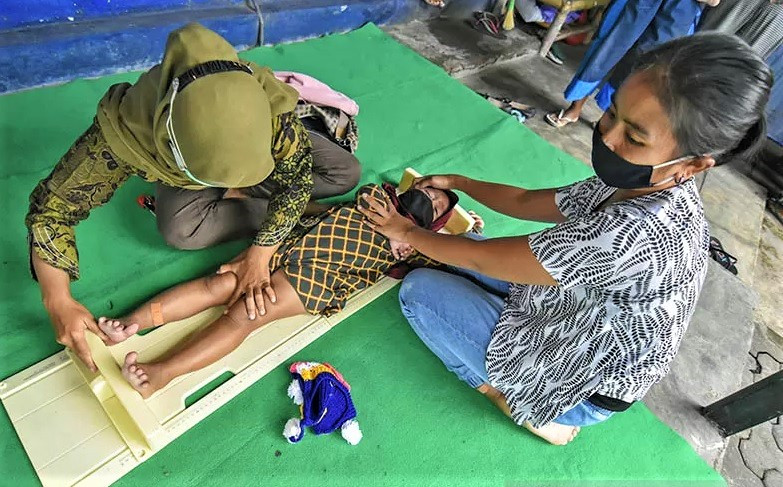Op-Ed: Stunting: Lessons learned and the way forward

One in four Indonesian children is stunted. Caused by malnutrition, the real problem with stunting is not its impact on height, but rather on a child’s brain development. Stunted children are susceptible to long-term developmental delays and weakened immune systems. The implications on health, academic success and economic opportunities cast a shadow on these children forever.
Despite the global pandemic, and disruption to essential healthcare services and vaccination delivery, Indonesia has managed to reduce its stunting rate from 31 percent in 2018 to 24 percent in 2021. What has gone right and what can we do more of?
While stunting can be prevented, it is a complex issue requiring a multidisciplinary solution and collaboration across different stakeholders. With the launch of the National Strategy to Accelerate Stunting Prevention (StraNas Stunting) in 2017, the government mobilized US$14.6 billion to converge health, nutrition and early-childhood interventions across 23 government ministries and agencies.
Coordinating efforts requires real-time, individualized data; regular surveys; and comprehensive-monitoring systems. Partnering with the World Bank, Tanoto Foundation published a dashboard with key metrics related to the child’s first 1,000 days. This serves as a central database for different organizations and government entities to not only better target and coordinate programs at the household level, but also to replicate and scale up impactful solutions.
The provincial governments play a pivotal role in allocating and approving budgets for health and nutrition initiatives. To better coordinate, harmonize and scale up behavioral-change communication programs across districts and municipalities, we embarked on a project with the United Nations Children’s Fund (UNICEF) to provide technical assistance to provincial governments in this regard.
To further accelerate stunting prevention and reduction, President Joko “Jokowi” Widodo earlier this year appointed the National Population and Planning Agency (BKKBN) to serve as the bridge between all other agencies and ministries, with an aim to fast-track the implementation of government programs on the ground.
Parents play a major role in their children’s health and wellbeing. A combination of equipping parents with research-backed information and public-health campaigns emphasizing the importance of breastfeeding, complementary feeding, good sanitation and hygiene practices and vaccinations have helped reduce stunting.
With increased awareness, what was previously an “invisible problem” to most parents and policymakers became obvious. Coupled with regular nudges, counseling and monitoring through posyandu (integrated community health posts) and home visits, parents are able to develop and sustain good habits.
Building on these outreach programs for parents, the foundation leveraged on existing infrastructure and developed training modules and systems to equip 600,000 family support team members (TPK) and 39,000 social workers from the conditional-cash transfer program (Pendamping Sosial PKH) with the skills to address stunting in their programs.
The rapid advancement of technology is also an opportunity to empower parents. Parents can now easily access important information on child development, as well as consult experts from their mobile phone. There is a growing list of such apps and platforms, for example Tentang Anak, Teman Bumil and Primaku, that are now widely available.
Given Indonesia’s diversity, programs to tackle stunting have to be customized based on local conditions.
The main causes of stunting and resources available locally vary from region to region. Reducing the stunting rate further would require local leaders and communities to innovate. The good news is that local communities are taking the lead to think out-of-the-box.
One such example is dentist and head of the local community-health center in East Kalimantan, Rika Puspita. She found a way to reduce stunting prevalence by effectively merging two existing programs, namely the maternal health and child-nutrition program, by using an innovative “clustering” system. Before, the mother-child dyad was clustered by administrative function. In the new format, pregnant women, mothers and children are grouped according to needs and local characteristics.
As a result, health professionals can provide more intensive counselling to at-risk families and data is collected in a more systematic and timely manner. The outcome speaks for itself. Data collection for the Bukuan community where this new clustering takes place now takes around three months, as compared to other regions which can take up to two years. Better data collection enables better decision-making and more targeted intervention, therefore expediting the action that has to be taken to reduce stunting.
Going forward, we have to double down on our investment in health and nutrition programs. While Indonesia has regulations relating to food fortification, more can be done in its implementation. The linkage between social protection and food fortification should be further strengthened. Campaigns on breastfeeding and complementary feeding must continue and reach the poorest and most vulnerable communities.
Our approach to tackle stunting must also be holistic, covering stimulation, health and nutrition. We have to continue to improve the quality of early-childhood education, starting at home with responsive caregiving and good parenting. Parents should instil a love of reading in their children from a young age, as well as provide a nurturing and safe environment for their children.
At the national and sub-national levels, more can be done to strengthen policies, programs and services. Multiple stakeholders including organizations such as ours, non-profits, corporates and the government have to work hand-in-hand. With our collective knowledge and experiences, we can leverage each other’s work to create an enabling environment for our children to thrive in.
This article was copied from Jakarta Post August 1, 2022 “Stunting: Lessons learned and the way forward”, written by Belinda Tanoto, member of the Board of Trustees at Tanoto Foundation. Tanoto Foundation is an independent family philanthropy organisation founded by Sukanto Tanoto and Tinah Bingei Tanoto in 1981.

Leave a Reply